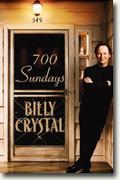700 Sundays
Billy Crystal
book reviews:
· general fiction
· chick lit/romance
· sci-fi/fantasy
· graphic novels
· nonfiction
· audio books
· author interviews
· children's books @
curledupkids.com
· DVD reviews @
curledupdvd.com
newsletter
win books
buy online
links
home
for authors
& publishers
for reviewers

 |
700 Sundays Billy Crystal Warner Books Hardcover 192 pages October 2005 |
|
Billy Crystal’s father, Jack, died when Billy was fourteen. Billy figures that he had 700 Sundays with his dad – hence the title of the book. Much of America probably knows Billy Crystal as the hugely entertaining host of several Oscar shows. What they don’t know is that Crystal comes from a family that made singular contributions to American music. Crystal’s uncle single-handedly revived the New York jazz scene in the post-Second World War period. His father promoted a number of black musicians - Billie Holiday and Louis Armstrong, among others. Crystal’s life growing up among entertainers convinced him that, while he didn’t have the talent to play baseball for the New York Yankees, he could make people laugh.
The book is poignant in detailing the fragile, and often temporary, connection that holds fathers and sons. Working two jobs, Jack Crystal had very little time for his family during the weekday. He was determined to devote Sundays to his three sons. Billy Crystal’s recollection of the first trip to Yankee Stadium to see Mickey Mantle play, the hours of throwing baseballs to teach Billy to hit, the hobnobbing with musicians -- all are recounted with fetching affection by a grateful son. The book loses its center after Jack Crystal’s death and goes adrift after that. While this is a structural problem, the narrative is still interesting enough to read. Crystal’s life after his father’s death, his relationship with his mother and brothers, and his professional success are all told with candor. The eponymous play met with considerable success on Broadway. The book is an adequate substitute for it. Originally published on Curled Up With A Good Book at www.curledup.com. © Ram Subramanian, 2005 |
|
|
|
 Click here to learn more about this month's sponsor! |
|
| fiction · sf/f · comic books · nonfiction · audio newsletter · free book contest · buy books online review index · links · · authors & publishers reviewers |
|
| site by ELBO Computing Resources, Inc. | |
 Written in an irreverential, wry tone , Crystal’s memoir of growing up is at once entertaining and poignant. His description of his relatives – as motley a crew of Jewish immigrants from Eastern Europe as there ever probably was – is both telling and laugh-out-loud funny. The chapter devoted to a phone conversation between his aunt Sheila and her friend Reba about aunt Sheila’s daughter’s lesbian relationship is guaranteed to evoke loud laughter, as an elderly Florida resident brought up in a different time explains her daughter’s lifestyle choice to her sixty-something friend.
Written in an irreverential, wry tone , Crystal’s memoir of growing up is at once entertaining and poignant. His description of his relatives – as motley a crew of Jewish immigrants from Eastern Europe as there ever probably was – is both telling and laugh-out-loud funny. The chapter devoted to a phone conversation between his aunt Sheila and her friend Reba about aunt Sheila’s daughter’s lesbian relationship is guaranteed to evoke loud laughter, as an elderly Florida resident brought up in a different time explains her daughter’s lifestyle choice to her sixty-something friend.